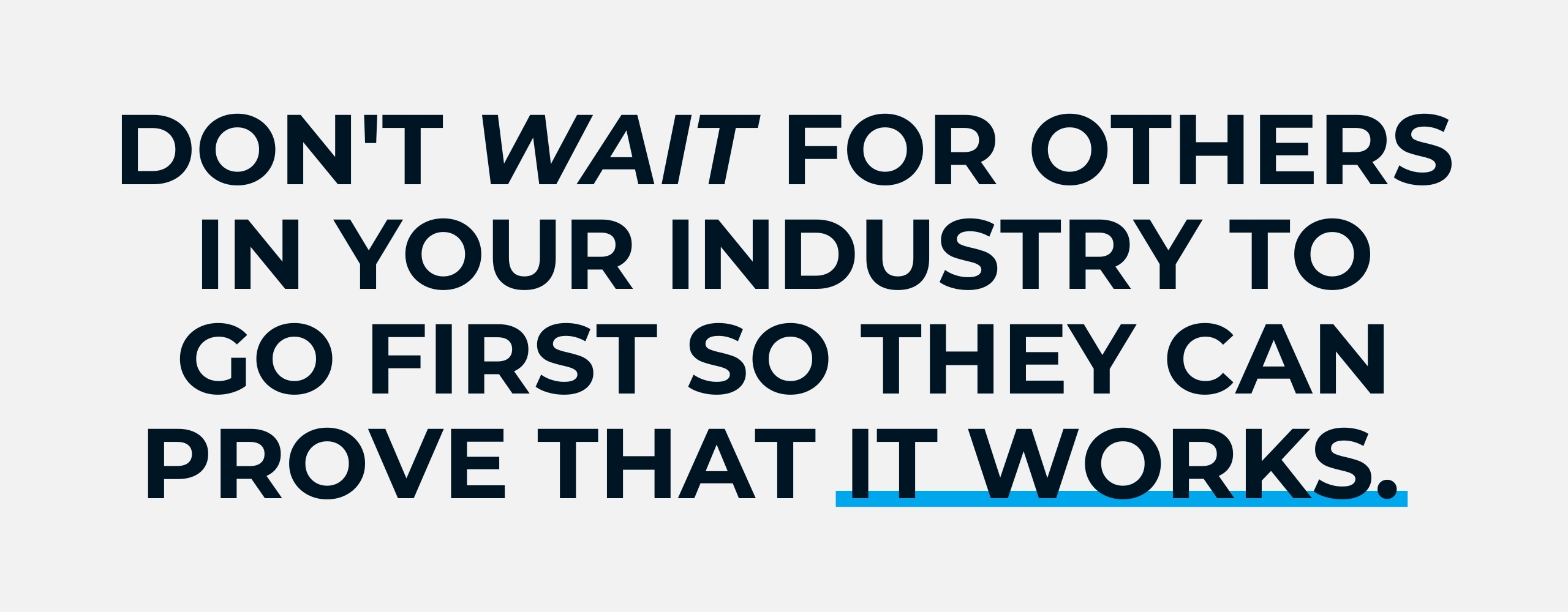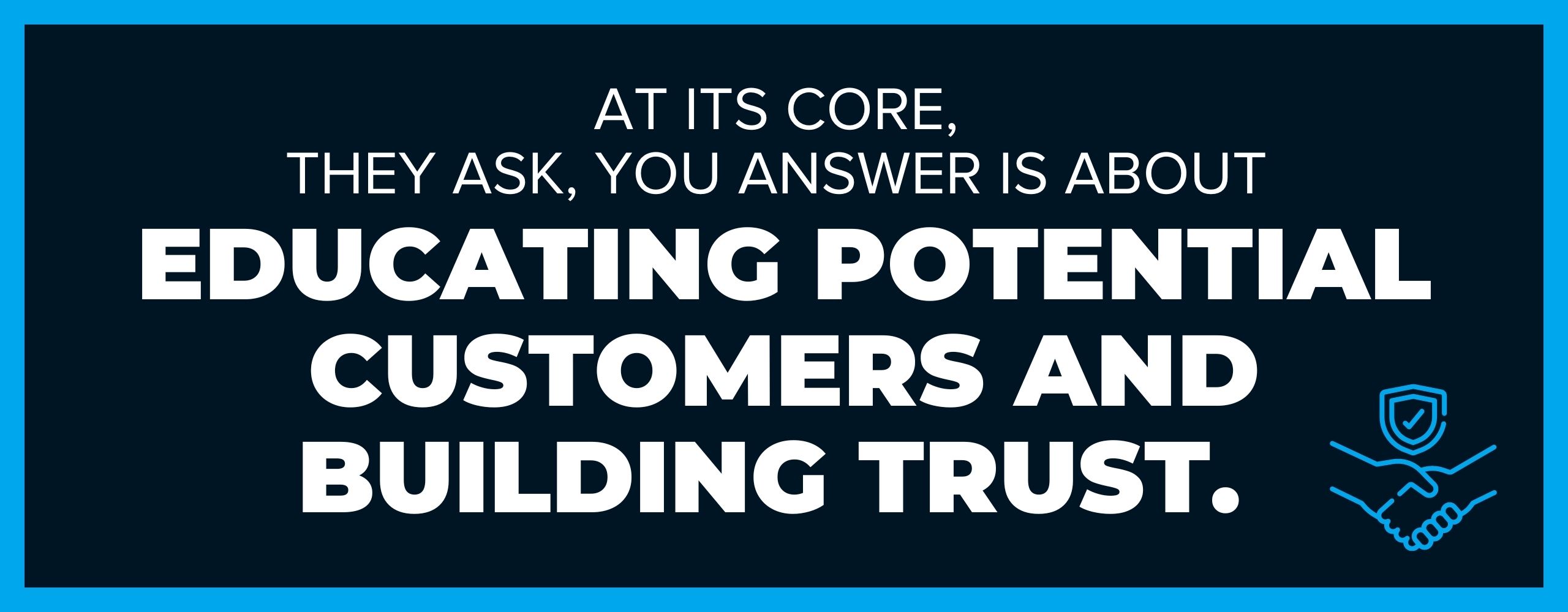Topics:
Interviews Executives and Leaders Content and Inbound Marketing 101 Getting Started with They Ask, You AnswerJoin 40,000+ sales and marketing pros who receive our weekly newsletter.
Get the most relevant, actionable digital sales and marketing insights you need to make smarter decisions faster... all in under five minutes.
Sure, They Ask, You Answer Works in Other Industries — But Will It Work in Mine?

By John Becker
Feb 23, 2023

At IMPACT, we believe that They Ask, You Answer is industry-agnostic. After all, at its core, it's based on a set of principles that should transcend all industry boundaries:
- Trust is the true currency of all business
- Educated buyers become happier customers
- We should be transparent and candid with our customers
Even so, we get a good deal of questions like the one in the title: Sure, They Ask, You Answer worked for someone else, but will it work for me?
I posed that question to the framework's founder, Marcus Sheridan, who (no surprise) has heard this question plenty of times himself as well.
Here's the full recording of our 11-minute interview, with a summary below.

The big tent of They Ask, You Answer
They Ask, You Answer all grew out of Marcus's attempt to save his pool company during the depths of the Great Recession.
Today, River Pools' website is the most trafficked pool website in the world. Marcus' company has grown into a franchise with locations in more than a dozen states.
With that in mind, it would be easy to think that other pool companies should steer clear and find a different way to go to market. There's no way you can compete with such a dominant force.
Wrong.
Many other pool companies have used They Ask, You Answer to grow. A handful are actually IMPACT clients. They're using the same tactics — in the same industry — and finding tremendous success.
No matter your niche, no matter your industry, They Ask, You Answer will help make it so:
- Visitors love your brand when they come to your site.
- They will want to engage with you.
- Potential customers will feel like they know you.
- They're going to say to their friends, "Everything I've ever learned about this thing I learned from these guys right here." It's going to increase your overall customer experience and your number of customer referrals.
Any business should be quick to embrace a marketing approach that can do so much for them.
Focusing on principles, not practices
We hear this all the time: a company leader is all-in on They Ask, You Answer. They see it as the future of marketing in their industry, but then they balk.
They say something like this:
"Sure, I can see why They Ask, You Answer worked for people selling pools (or roofs, or dental billing software), but I don't think it will work for me. You see, we're different."
To Marcus, this is an excuse that shows a lack of original thinking.
To him, "the companies that sit there all day and feel like they're so different from everybody else are the ones having the least success online right now."
The principles apply to everyone.
But it's the application of those principles that calls for creativity.
Companies should get creative and think of ways to apply the principles of They Ask, You Answer to their unique needs and circumstances.

Sure, the way the HVAC company or insurance business implemented They Ask, You Answer might not work the exact same way for you, but the principles of buyer education and trust-building content definitely will.
So, should you wait to see how others in your industry fare?
No.
That approach is deeply flawed, according to Marcus.
It's akin to saying "Well, I'm not sure how this internet thing is going to work out, so I'm going to wait and see if my competitors build websites."
Principles, broadly applied
They Ask, You Answer was built on a set of principles, not a series of tactics. It's not about Facebook or LinkedIn or TikTok. It's really not even about Google. The reason for this, says Marcus, is because platforms come and go. They're finite.
Instead, it's about principles like building trust, principles that go on forever.
Think about it this way. No matter your industry, would you answer "yes" to the following questions?
- Do your buyers have a set of questions, worries, fears, and issues before they buy?
- Would having answers to these things help them feel ready to buy?
- Is it possible if they knew those things and they learned them from you, that your sales cycle would be shorter?
- Does your sales team ever answer the same questions over and over again?
- Is your business built on relationships?
If you've got a multi-step sales process, it's likely these apply to you, no matter what industry or niche you're in.
Don’t be limited by what your competition has done
Chances are you didn't grow your business by waiting to see what your competitors did and then following suit.
Rather, you forged a path, listened to the marketplace, and obsessed over your customers' needs.
You should take the same approach to They Ask, You Answer.
As Marcus puts it, "If you need to see all the ways somebody was successful with They Ask, You Answer, there's a very good chance you're already off track because you're still more focused on the competitor than you are with the only group that really matters...your buyers."
You don't become known as an innovative company by following your competition. That's the quickest way to limit your potential.
It should be no different with your marketing.
If there are no trusted voices in your industry, get going!
Is there a trust deficit in your industry? Are buyers skeptical of the pitches they hear from salespeople? If so, you can become that trusted voice. Just follow the framework and get going.
What you shouldn't do is wait for others in your industry to go first so they can prove that it works.
As for Marcus, he's always pretty shocked when he hears companies ask for more They Ask, You Answer case studies from their industry.

"If no one's done this before you," he says, "what a tremendous opportunity to be that most trusted, most trafficked, most cited voice in your industry."
And why wouldn't you want that?
Find your angle and get started
The person who reads They Ask, You Answer with the right mindset doesn't read it looking for case studies.
Instead, they read it and can barely wait to get started.
They think, "Oh my goodness. I haven't really been obsessing over my customer's questions! I haven't been addressing their fears, worries, and concerns. I haven't been selling to them the way they want to be sold to."

If you're reading the book and looking for examples of businesses in your space that are already using this framework, you're missing the point.
See opportunity, not limitation
If you're in an industry where They Ask, You Answer has been done before, nothing should change about your approach.
The same tactics and principles will work for you — it's just up to you and your team to apply them creatively.
Marcus advises that you look outside of your industry for inspiration.
At its core, They Ask, You Answer is about educating potential customers and building trust. To accomplish this, you need to teach your buyers how and where they like to learn.
That could mean ebooks and articles, it could mean TikTok and YouTube Shorts. It could mean tradeshows and webinars.
As Marcus says, "you start with the customer, you start with their questions, their fears, and their wants."
When you keep your customer at the center of your marketing and sales process, you're headed in the right direction, whether you're B2B, B2C, product/service, big/small, local/national, or mom-and-pop.
As we like to say: No matter what business we're in, we all use trust as the common currency.

